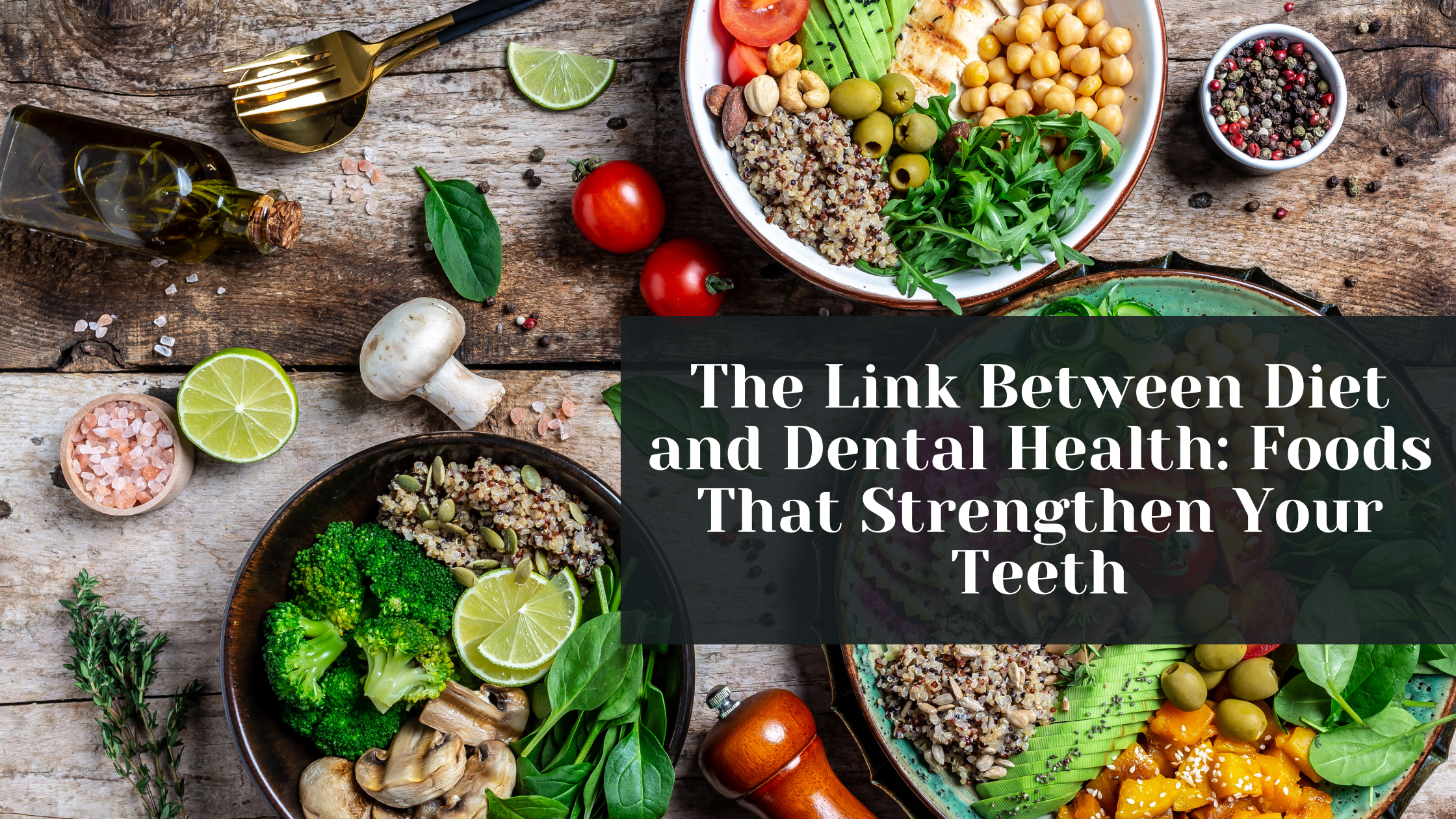When it comes to maintaining good oral health, most people think about regular brushing, flossing, and routine dentist visits. While these practices are essential, one aspect often overlooked is the significant impact of diet on dental health. What you eat can profoundly influence the strength and health of your teeth. Keep reading because we are going to explore the link between diet and dental health, and we’ll discuss some foods that can strengthen your teeth.
The Basics of Dental Health
Before delving into the specifics of foods that promote dental health, it’s important to understand the basics of oral hygiene and how teeth function. Teeth are complex structures of enamel, dentin, pulp, and cementum. Enamel, the outermost layer of the tooth, is the hardest tissue in the human body.
However, it can still be vulnerable to decay and damage, especially when exposed to acidic substances and bacteria. To maintain strong and healthy teeth, it’s crucial to:
- Brush and Floss Regularly: Brushing and flossing help remove plaque and food particles from the surface of your teeth, reducing the risk of tooth decay and gum disease.
- Visit Your Dentist: Regular dental check-ups are essential for identifying and addressing oral health issues early on.
- Maintain a Balanced Diet: The foods you eat play a significant role in the overall health of your teeth and gums.
The Impact of Diet on Dental Health
The food and drinks you consume can either support or harm your oral health. Diets high in sugar and acidity can contribute to tooth decay and enamel erosion, leading to cavities and other dental problems. On the other hand, a diet rich in nutrients that promote strong teeth and healthy gums can help prevent these issues.
Foods That Strengthen Your Teeth
Here are some foods that can help strengthen your teeth and promote good oral health:
Dairy Products
Dairy products like milk, cheese, and yogurt are excellent sources of calcium and phosphorus, which are crucial for building and maintaining strong teeth. Calcium is the primary mineral component of teeth and bones, and phosphorus plays a key role in strengthening tooth enamel. Additionally, dairy products contain casein, a protein that can help prevent cavities by forming a protective layer over the teeth.
Leafy Greens
Leafy green vegetables such as kale, spinach, and collard greens are rich in vitamins and minerals, including calcium and folic acid. These nutrients are essential for maintaining healthy teeth and gums. Folic acid, in particular, has been linked to reducing gum inflammation and supporting overall oral health.
Crunchy Fruits and Vegetables
Fruits and vegetables like apples, carrots, and celery have a natural abrasiveness that can help clean your teeth as you eat them. Chewing on these foods stimulates saliva production, which helps neutralize acids and prevent plaque buildup. Additionally, these foods are rich in vitamins and fiber, which are beneficial for your overall health.
Nuts and Seeds
Nuts and seeds, such as almonds, cashews, and sesame seeds, are packed with essential minerals like calcium and phosphorus. Chewing on these foods can also help stimulate saliva production and reduce the risk of tooth decay. Just be mindful of portion sizes, as these foods are calorie-dense.
Fish
Fatty fish like salmon and mackerel are excellent sources of vitamin D, which is necessary for the absorption of calcium. Vitamin D helps ensure that your body can effectively use the calcium you consume to strengthen your teeth and bones.
Lean Proteins
Lean proteins like chicken, turkey, and lean cuts of beef contain high levels of phosphorus, which, as mentioned earlier, is essential for maintaining tooth enamel. These proteins are also low in sugar and carbohydrates, reducing the risk of feeding harmful oral bacteria.
Water
Staying hydrated is crucial for oral health. Water helps wash away food particles, bacteria, and acids that can contribute to tooth decay and gum disease. Many communities add fluoride to their water supply, which can further strengthen teeth and reduce the risk of cavities.
Foods to Limit or Avoid
In addition to incorporating tooth-strengthening foods into your diet, it’s essential to be aware of foods and beverages that can have a negative impact on your dental health. These items include:
- Sugary Snacks and Beverages: Candy, soda, and other sugary treats can promote the growth of harmful bacteria in your mouth and lead to tooth decay.
- Acidic Foods and Drinks: Citrus fruits, tomatoes, and acidic beverages like orange juice and soft drinks can erode tooth enamel over time. If you consume these items, be sure to rinse your mouth with water afterward.
- Starchy Foods: Foods high in refined carbohydrates, like white bread and potato chips, can break down into sugars and contribute to tooth decay.
- Alcohol and Tobacco: Alcohol can dry out your mouth, reducing saliva production and increasing the risk of cavities. Tobacco use, whether smoking or chewing, is associated with a higher risk of gum disease and oral cancer.
Practical Tips for a Tooth-Healthy Diet
Now that you know which foods to include and which to limit in your diet for better dental health, here are some practical tips to help you maintain a tooth-healthy diet:
- Balanced Meals: Strive for a well-balanced diet that includes a variety of foods from different food groups. This will ensure you get a wide range of nutrients that support your oral health.
- Moderation: While some foods are better for your teeth than others, it’s not always necessary to completely eliminate less healthy options. Enjoy sugary or acidic treats in moderation and be sure to practice good oral hygiene afterward.
- Hydration: Drink plenty of water throughout the day. Water helps rinse away food particles and acids, promoting a healthy oral environment.
- Snack Smart: If you need a snack between meals, choose tooth-friendly options like nuts, fruits, or vegetables.
- Avoid Grazing: Limit the number of times you eat during the day. Frequent snacking can expose your teeth to acids and sugars more often.
- Chew Sugar-Free Gum: Chewing sugar-free gum can stimulate saliva production, which helps protect your teeth. Look for gum with xylitol, a sugar substitute that can inhibit the growth of cavity-causing bacteria.
Stay Up to Date with All of The Latest Dental Trends with Sheehan Dental
Whether it’s in the clinic or outside of it, we here at Sheehan Dental are dedicated to ensuring that your smile stays happy and healthy. Whether it’s advising you on the foods to avoid or ensuring that everything is alright during your check-ups, you can always rely on our team of dental professionals. Schedule an appointment today.




